Ditapis dengan

Crucible of the Middle Ages, The: The Ninth and Tenth Centuries in European H…
- Edisi
- -
- ISBN/ISSN
- -
- Deskripsi Fisik
- 216 hal
- Judul Seri
- -
- No. Panggil
- 940.1 B271c
- Edisi
- -
- ISBN/ISSN
- -
- Deskripsi Fisik
- 216 hal
- Judul Seri
- -
- No. Panggil
- 940.1 B271c

Membentuk Kerohanian Anak Muda di Zaman Postmodern : Sebuah Penuntun bagi Par…
- Edisi
- Second Edition
- ISBN/ISSN
- 978-602-96700-9-7
- Deskripsi Fisik
- 245 hal
- Judul Seri
- -
- No. Panggil
- 259\'.2 D9221m
- Edisi
- Second Edition
- ISBN/ISSN
- 978-602-96700-9-7
- Deskripsi Fisik
- 245 hal
- Judul Seri
- -
- No. Panggil
- 259\'.2 D9221m
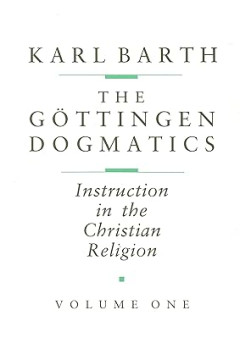
Gottingen Dogmatics, The : Instruction in the Christian Religion
Outline : One of the greatest theologians of the twentieth century, Karl Barth is best known for his monumental Church Dogmatics, a work that changed the modern theological landscape. It is less well known that Barth taught three distinct cycles of courses in dogmatics during his lifetime. HIs first effort consisted of a series of lectures at the University of Gottingen in 1924-25. These provoc…
- Edisi
- First Edition
- ISBN/ISSN
- 0-8028-2421-8
- Deskripsi Fisik
- 490 hal
- Judul Seri
- -
- No. Panggil
- 230\'.044 B28221g v.1
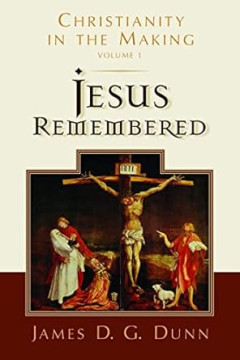
Christianity in the Making : Volume 1 : Jesus Remembered
- Edisi
- -
- ISBN/ISSN
- 978-0-8028-7799-4
- Deskripsi Fisik
- 1019 hal
- Judul Seri
- -
- No. Panggil
- 232 D9221c v.1
- Edisi
- -
- ISBN/ISSN
- 978-0-8028-7799-4
- Deskripsi Fisik
- 1019 hal
- Judul Seri
- -
- No. Panggil
- 232 D9221c v.1
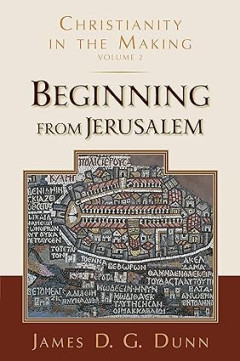
Christianity in the Making : Volume 2 : Beginning from Jerusalem
- Edisi
- -
- ISBN/ISSN
- 978-0-8028-7800-7
- Deskripsi Fisik
- 1347 hal
- Judul Seri
- -
- No. Panggil
- 270.1 D9221c v.2
- Edisi
- -
- ISBN/ISSN
- 978-0-8028-7800-7
- Deskripsi Fisik
- 1347 hal
- Judul Seri
- -
- No. Panggil
- 270.1 D9221c v.2

Christianity in the Making : Volume 3 : Neither Jew nor Greek : a Contested I…
Outline : The Culmination of James D. G. Dunn's Three - Volume Magnum Opus on the development of early Christianity.
- Edisi
- -
- ISBN/ISSN
- 978-0-8028-7801-4
- Deskripsi Fisik
- 946 hal
- Judul Seri
- -
- No. Panggil
- 270.1 D9221c v.3

John's Use of the Old Testament in Revelation : Journal for the Study of the …
Outline : The Library of New Testament Studies (LNTS) is a premier book series that offers cutting-edge for a readership of scholars, teachers in the field of New Testament studies, postgraduate students and advanced undergraduates. All the many and diverse aspects of New Testament study are represented and promoted, including innovative work from historical perspectives, studies using social-s…
- Edisi
- -
- ISBN/ISSN
- 978-0-5676-5752-7
- Deskripsi Fisik
- 443 hal
- Judul Seri
- Library of New Testament Studies
- No. Panggil
- 228.06 B365j
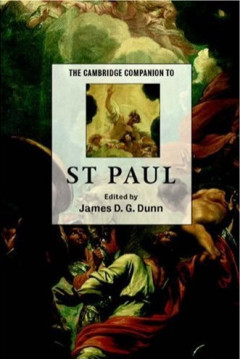
Cambridge companion to St. Paul
edited by James D.G. Dunn.
- Edisi
- -
- ISBN/ISSN
- 978-0-521-78155-8
- Deskripsi Fisik
- xx, 301 p. : map ; 24 cm (online)
- Judul Seri
- Cambridge companions to religion
- No. Panggil
- Online
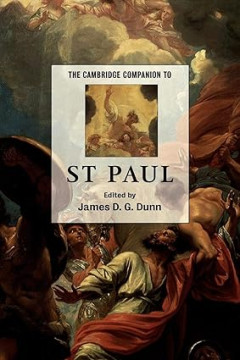
Cambridge Companion to St Paul, The
Outline: The apostle Paul has been justifiably described as the first and greatest Christian theologian. His letters were among the earliest documents to be included in the New Testament and, as such, they shaped Christian thinking from the beginning. As a missionary, theologian and pastor Paul's own wrestling with theological and ethical questions of his day is paradigmatic for Christian theol…
- Edisi
- First Edition
- ISBN/ISSN
- 978-0-521-78694-2
- Deskripsi Fisik
- 301 hal
- Judul Seri
- -
- No. Panggil
- 225.9/2 D9221c
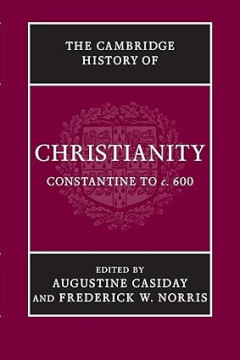
Cambridge History of Christianity, The : Constantine to c. 600
Outline: The Cambridge History of Christianity offers a comprehensive chronological account of the development of Christianity in all its aspects - theological, intellectual, social, political, regional, global - from its beginnings to the present day. Each volume makes a substantial contribution in its own right to the scholarship of its period and the complete History constitutes a major work…
- Edisi
- First Edition
- ISBN/ISSN
- 978-0-521-81244-3
- Deskripsi Fisik
- 758 hal
- Judul Seri
- -
- No. Panggil
- 270.2 C269c

Crucible of the Middle Ages, The: The Ninth and Tenth Centuries in European H…
- Edisi
- -
- ISBN/ISSN
- -
- Deskripsi Fisik
- 216 hal
- Judul Seri
- -
- No. Panggil
- 940.1 B271c
- Edisi
- -
- ISBN/ISSN
- -
- Deskripsi Fisik
- 216 hal
- Judul Seri
- -
- No. Panggil
- 940.1 B271c
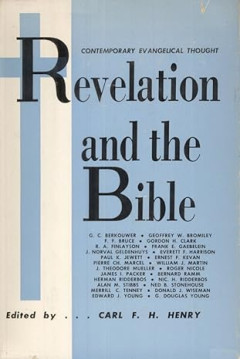
Revelation and the Bible: Contemporary Evangelical Thought
Outline: This volume deals with with the crucial subject in today's theological debate, the authority of Scripture. Editor Henry in the Preface speaks of this subject as "the watershed of theological conviction." Twenty-four international scholars, under the editorship of Dr. Carl F. H. Henry, Editor of Chritianity Today, give evangelical view on such phases of the subject a ..., inspiration, t…
- Edisi
- First Edition
- ISBN/ISSN
- -
- Deskripsi Fisik
- 413 hal
- Judul Seri
- -
- No. Panggil
- 220.13 H3961r

Celebration Hymnal, The : Songs and Hymns for Worship : Conductor Score : Vol…
- Edisi
- -
- ISBN/ISSN
- 080689357879
- Deskripsi Fisik
- 800 hal
- Judul Seri
- -
- No. Panggil
- R 781 Kir c v.1
- Edisi
- -
- ISBN/ISSN
- 080689357879
- Deskripsi Fisik
- 800 hal
- Judul Seri
- -
- No. Panggil
- R 781 Kir c v.1

Celebration Hymnal, The : Songs and Hymns for Worship : Conductor Score : Vol…
- Edisi
- -
- ISBN/ISSN
- -
- Deskripsi Fisik
- 812 hal
- Judul Seri
- -
- No. Panggil
- R 781 Kir c v.2
- Edisi
- -
- ISBN/ISSN
- -
- Deskripsi Fisik
- 812 hal
- Judul Seri
- -
- No. Panggil
- R 781 Kir c v.2

Christology in the Making: A New Testament Inquiry into the Origins of the Do…
This text is designed for students and academics studying the doctrine of the incarnation. James Dunn clarifies in detail the beginnings of the belief in Christ as the Son of God and discusses the historical context of such beliefs.
- Edisi
- Second Edition
- ISBN/ISSN
- 9780334029298
- Deskripsi Fisik
- 443 p.
- Judul Seri
- -
- No. Panggil
- online
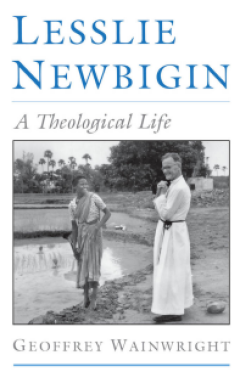
LESSLIE NEWBIGIN A Theological Life
This book offers an intellectual and spiritual biography of Lesslie Newbigin, a figure of patristic proportions in the twentieth-century history of the Church. Drawing on thirty-five years of personal and literary acquaintance with his subject and on a thorough examination of the Newbigin archives, Geoffrey Wainwright crafts a rich and varied portrait of this outstanding witness to the Gospel.
- Edisi
- -
- ISBN/ISSN
- 0-19-510171-5
- Deskripsi Fisik
- 480 P.
- Judul Seri
- -
- No. Panggil
- Online
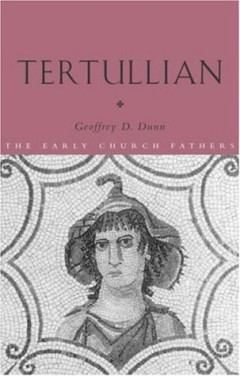
Tertullian
This book is the first accessible introduction in English to Tertullian's works, providing translations of Adversus Iudaeos (Against the Jews), Scorpiace (Antidote for the Scorpion's Sting) and De Verginibus Velandis (On the Veiling of Virgins). Tertullian (c. AD 160 - 225) was one of the first theologians of the Western Church and ranks among the most prominent of the early Latin fathers. H…
- Edisi
- -
- ISBN/ISSN
- 0415282306
- Deskripsi Fisik
- 166 p.
- Judul Seri
- -
- No. Panggil
- online
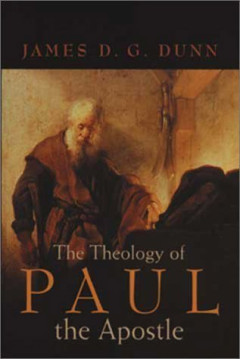
The Theology of Paul the Apostle
Using Paul's letter to the Romans as the foundation for constructing a fuller exposition of Paul's whole theology, Dunn's thematic treatment clearly describes Paul's teaching on such topics as God, humankind, sin, Christology, salvation, the church, and the nature of the Christian life. In the process Dunn engages, in a concise way, with what other important scholars have said regarding each ar…
- Edisi
- First
- ISBN/ISSN
- 0802838448
- Deskripsi Fisik
- 808 p.
- Judul Seri
- -
- No. Panggil
- online
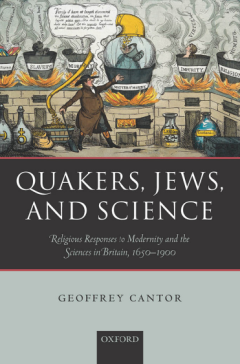
Quakers, Jews, and Science
How do science and religion interact? This study examines the ways in which two minorities in Britain - the Quaker and Anglo-Jewish communities - engaged with science. Drawing on a wealth of documentary material, Geoffrey Cantor charts the participation of Quakers and Jews in many different aspects of science.
- Edisi
- First Edition
- ISBN/ISSN
- 0-19-927668-4
- Deskripsi Fisik
- 432 p.
- Judul Seri
- -
- No. Panggil
- online
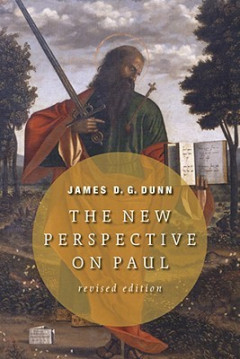
The New Perspective on Paul
This collection of essays highlights a dimension of Paul's theology of justification that has been neglected -- that his teaching emerged as an integral part of his understanding of his commission to preach the gospel to non-Jews and that his dismissal of justification "by works of the law" was directed not so much against Jewish legalism but rather against his fellow Jews' assumption that the …
- Edisi
- Revised
- ISBN/ISSN
- 9780802845627
- Deskripsi Fisik
- 539 p. ; 23 cm
- Judul Seri
- -
- No. Panggil
- -
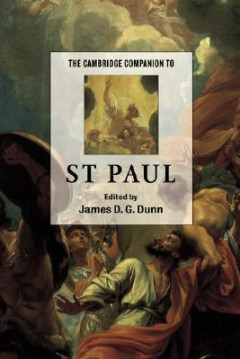
The Cambridge Companion to St Paul
The apostle Paul has been justifiably described as the first and greatest Christian theologian. His letters were among the earliest documents to be included in the New Testament and, as such, they influenced Christian thinking from its very beginning. This Companion provides an important assessment of the apostle as well as a new appreciation of his continuing contemporary significance. With ei…
- Edisi
- First
- ISBN/ISSN
- 9780521781558
- Deskripsi Fisik
- 276 p.
- Judul Seri
- -
- No. Panggil
- -

The Mating Mind : how sexual choice shaped the evolution of human nature
At once a pioneering study of evolution and an accessible and lively reading experience, The Mating Mind marks the arrival of a prescient and provocative new science writer. Psychologist Geoffrey Miller offers the most convincing'and radical'explanation for how and why the human mind evolved. Consciousness, morality, creativity, language, and art: these are the traits that make us human. Scient…
- Edisi
- First
- ISBN/ISSN
- 038549517X
- Deskripsi Fisik
- 411 p.
- Judul Seri
- -
- No. Panggil
- -
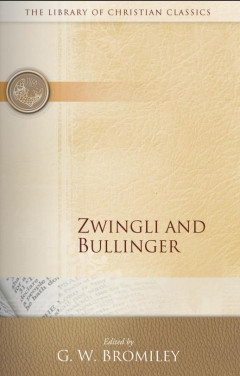
Zwingli and Bullinger
The Christian Church possesses in its literature an abundant and incomparable treasure. But it is an inheritance that must be reclaimed by each generation. THE LIBRARY OF CHRISTIAN CLASSICS is designed to present in the English language, and in twenty-six volumes of convenient size, a selection of the most indispensable Christian treatises written prior to the end of the sixteenth century.
- Edisi
- First Edition
- ISBN/ISSN
- 978-0-664-24159-9
- Deskripsi Fisik
- 364 p. ; 22 cm
- Judul Seri
- The Library of Christian Classics
- No. Panggil
- Online

Churces on MIssion : God's Grace Abounding to the Nations
Outline: The twenty-first century is marked by a renewed emphasis on the missional responsibility of individual Christians and local churches. Churches on Mission : God's Grace Abounding to the Nations is an attempt to explore the relationship between the local church and its missionary responsibilities. Through history, theology, case studies, and actual ministry practices, each author in this…
- Edisi
- -
- ISBN/ISSN
- 9780878085293
- Deskripsi Fisik
- 339
- Judul Seri
- -
- No. Panggil
- 270\'.2 H258c

Spirit of God : Christian Renewal in the Community of Faith
Outline: While the age of the Holy Spirit began with Pentecost, the twentieth century has seen as explosion in the Spirit's work through the remarkable growth of Pentecostalism and the changing face of global Christianity. The essays gathered in Spirit of God: Christian Renewal in the Community of Faith provide an ecumenical exploration of the Holy Spirit's person and work in biblical, historic…
- Edisi
- -
- ISBN/ISSN
- 978-0-8308-2464-9
- Deskripsi Fisik
- 266 hal
- Judul Seri
- -
- No. Panggil
- 231.3 B2327s

Theology of John Calvin, The
Outline: Though Karl Barth wrote his lectures on John Calvin more than seventy years ago, the wrestling of one theological giant with another can hardly fail to be exciting and instructive. Delivered at the University of Gottingen in 1922, Barth's lectures offer a brilliant analysis of the Reformation - of Calvin in particular - while at the same time providing vital insights into the developme…
- Edisi
- -
- ISBN/ISSN
- 0-8028-0696-1
- Deskripsi Fisik
- 424
- Judul Seri
- -
- No. Panggil
- 230.42092 B2841t c.1

Horizons in Hermeneutics : A Festschrift in Honor of Anthony C. Thiselton
- Edisi
- -
- ISBN/ISSN
- 978-0-8028-6927-2
- Deskripsi Fisik
- 301
- Judul Seri
- -
- No. Panggil
- 220.601 P8441h c.1
- Edisi
- -
- ISBN/ISSN
- 978-0-8028-6927-2
- Deskripsi Fisik
- 301
- Judul Seri
- -
- No. Panggil
- 220.601 P8441h c.1

Celebration Hymnal, The - Songs and Hymns for Worship : Conductor Score Volum…
- Edisi
- -
- ISBN/ISSN
- -
- Deskripsi Fisik
- -
- Judul Seri
- -
- No. Panggil
- R 783.9 W891chc v.2
- Edisi
- -
- ISBN/ISSN
- -
- Deskripsi Fisik
- -
- Judul Seri
- -
- No. Panggil
- R 783.9 W891chc v.2

Celebration Hymnal, The - Songs and Hymns for Worship : Conductor Score Volum…
- Edisi
- -
- ISBN/ISSN
- 080689357879
- Deskripsi Fisik
- -
- Judul Seri
- -
- No. Panggil
- R 783.9 W891chc v.1
- Edisi
- -
- ISBN/ISSN
- 080689357879
- Deskripsi Fisik
- -
- Judul Seri
- -
- No. Panggil
- R 783.9 W891chc v.1

Library of Christian Classics, The : Volume XXIV - Zwingli and Bullinger
- Edisi
- -
- ISBN/ISSN
- -
- Deskripsi Fisik
- 365
- Judul Seri
- The Library of Christian Classics
- No. Panggil
- 808 B788l
- Edisi
- -
- ISBN/ISSN
- -
- Deskripsi Fisik
- 365
- Judul Seri
- The Library of Christian Classics
- No. Panggil
- 808 B788l

Instrumental Hymnal, The : 612 Complete Orchestrations from The Hymnal for Wo…
- Edisi
- -
- ISBN/ISSN
- 978-3015019311
- Deskripsi Fisik
- -
- Judul Seri
- -
- No. Panggil
- 784.2 F431i
- Edisi
- -
- ISBN/ISSN
- 978-3015019311
- Deskripsi Fisik
- -
- Judul Seri
- -
- No. Panggil
- 784.2 F431i

Celebration Hymnal, The - Songs and Hymns for Worship : Percussion Hymn 401 -…
- Edisi
- -
- ISBN/ISSN
- 080689367878
- Deskripsi Fisik
- 1066
- Judul Seri
- -
- No. Panggil
- R 783.9 W891chp v.2
- Edisi
- -
- ISBN/ISSN
- 080689367878
- Deskripsi Fisik
- 1066
- Judul Seri
- -
- No. Panggil
- R 783.9 W891chp v.2

Celebration Hymnal, The - Songs and Hymns for Worship : Percussion Hymn 1 - 400
- Edisi
- -
- ISBN/ISSN
- 080689367878
- Deskripsi Fisik
- 534
- Judul Seri
- -
- No. Panggil
- R 783.9 W891chp v.1
- Edisi
- -
- ISBN/ISSN
- 080689367878
- Deskripsi Fisik
- 534
- Judul Seri
- -
- No. Panggil
- R 783.9 W891chp v.1

Celebration Hymnal, The - Songs and Hymsn for Worship : Tenor Saxophone, Bari…
- Edisi
- -
- ISBN/ISSN
- 080689361876
- Deskripsi Fisik
- 1066
- Judul Seri
- -
- No. Panggil
- R 783.9 W891chtb v.2
- Edisi
- -
- ISBN/ISSN
- 080689361876
- Deskripsi Fisik
- 1066
- Judul Seri
- -
- No. Panggil
- R 783.9 W891chtb v.2

Celebration Hymnal, The - Songs and Hymns for Worship : Tenor Saxophone, Bari…
- Edisi
- -
- ISBN/ISSN
- 080689361876
- Deskripsi Fisik
- 534
- Judul Seri
- -
- No. Panggil
- R 783.9 W891chtsb v.1
- Edisi
- -
- ISBN/ISSN
- 080689361876
- Deskripsi Fisik
- 534
- Judul Seri
- -
- No. Panggil
- R 783.9 W891chtsb v.1

Celebration Hymnal, The - Songs and Hymns for Worship : Trombone 1, 2 Hymn 40…
- Edisi
- -
- ISBN/ISSN
- 080689366871
- Deskripsi Fisik
- 1066
- Judul Seri
- -
- No. Panggil
- R 783.9 W891cht v.2
- Edisi
- -
- ISBN/ISSN
- 080689366871
- Deskripsi Fisik
- 1066
- Judul Seri
- -
- No. Panggil
- R 783.9 W891cht v.2

Celebration Hymnal, The - Songs and Hymns for Worship : Trombone 1, 2 Hymn 1 …
- Edisi
- -
- ISBN/ISSN
- 080689366871
- Deskripsi Fisik
- 534
- Judul Seri
- -
- No. Panggil
- R 783.9 W891cht v.1
- Edisi
- -
- ISBN/ISSN
- 080689366871
- Deskripsi Fisik
- 534
- Judul Seri
- -
- No. Panggil
- R 783.9 W891cht v.1

Celebration Hymnal, The - Songs and Hymns for Worship : Alto Saxophone Hymn 4…
- Edisi
- -
- ISBN/ISSN
- 080689363870
- Deskripsi Fisik
- 1066
- Judul Seri
- -
- No. Panggil
- R 783.9 W891chas v.2
- Edisi
- -
- ISBN/ISSN
- 080689363870
- Deskripsi Fisik
- 1066
- Judul Seri
- -
- No. Panggil
- R 783.9 W891chas v.2

Celebration Hymnal, The - Songs and Hymns for Worship : Alto Saxophone Hymn 1…
- Edisi
- -
- ISBN/ISSN
- 080689363870
- Deskripsi Fisik
- 534
- Judul Seri
- -
- No. Panggil
- R 783.9 W891chas v.1
- Edisi
- -
- ISBN/ISSN
- 080689363870
- Deskripsi Fisik
- 534
- Judul Seri
- -
- No. Panggil
- R 783.9 W891chas v.1

Celebration Hymnal, The - Songs and Hymns for Worship : Cello Hymn 401 - 818
- Edisi
- -
- ISBN/ISSN
- 080689370878
- Deskripsi Fisik
- 1066
- Judul Seri
- -
- No. Panggil
- R 783.9 W891chc v.2
- Edisi
- -
- ISBN/ISSN
- 080689370878
- Deskripsi Fisik
- 1066
- Judul Seri
- -
- No. Panggil
- R 783.9 W891chc v.2

Celebration Hymnal, The - Songs and Hymns for Worship : Cello Hymn 1 - 400
- Edisi
- -
- ISBN/ISSN
- 080689370878
- Deskripsi Fisik
- 534
- Judul Seri
- -
- No. Panggil
- R 783.9 W891chc v.1
- Edisi
- -
- ISBN/ISSN
- 080689370878
- Deskripsi Fisik
- 534
- Judul Seri
- -
- No. Panggil
- R 783.9 W891chc v.1

Celebration Hymnal, The - Songs and Hymns for Worship : Flute 1, 2 (Oboe) Hym…
- Edisi
- -
- ISBN/ISSN
- 080689358876
- Deskripsi Fisik
- 1066
- Judul Seri
- -
- No. Panggil
- R 783.9 W891chf v.2
- Edisi
- -
- ISBN/ISSN
- 080689358876
- Deskripsi Fisik
- 1066
- Judul Seri
- -
- No. Panggil
- R 783.9 W891chf v.2

Celebration Hymnal, The - Songs and Hymns for Worship : Flute 1, 2 (Oboe) Hym…
- Edisi
- -
- ISBN/ISSN
- 080689358876
- Deskripsi Fisik
- 534
- Judul Seri
- -
- No. Panggil
- R 783.9 W891chf v.1
- Edisi
- -
- ISBN/ISSN
- 080689358876
- Deskripsi Fisik
- 534
- Judul Seri
- -
- No. Panggil
- R 783.9 W891chf v.1

Celebration Hymnal, The - Songs and Hymns for Worship : French Horn Hymn 401 …
- Edisi
- -
- ISBN/ISSN
- 080689362873
- Deskripsi Fisik
- 1066
- Judul Seri
- -
- No. Panggil
- R 783.9 W891chfh v.2
- Edisi
- -
- ISBN/ISSN
- 080689362873
- Deskripsi Fisik
- 1066
- Judul Seri
- -
- No. Panggil
- R 783.9 W891chfh v.2

Celebration Hymnal, The - Songs and Hymns for Worship : French Horn Hymn 1 - 400
- Edisi
- -
- ISBN/ISSN
- 080689362873
- Deskripsi Fisik
- 534
- Judul Seri
- -
- No. Panggil
- R 783.9 W891chfh v.1
- Edisi
- -
- ISBN/ISSN
- 080689362873
- Deskripsi Fisik
- 534
- Judul Seri
- -
- No. Panggil
- R 783.9 W891chfh v.1

Celebration Hymnal, The - Songs and Hymns for Worship : Trumpet 1 Hymn 401 - 818
- Edisi
- -
- ISBN/ISSN
- 080689364877
- Deskripsi Fisik
- 1066
- Judul Seri
- -
- No. Panggil
- R 783.9 W891cht v.2
- Edisi
- -
- ISBN/ISSN
- 080689364877
- Deskripsi Fisik
- 1066
- Judul Seri
- -
- No. Panggil
- R 783.9 W891cht v.2

Celebration Hymnal, The - Songs and Hymns for Worship : Viola Hymn 401 - 818
- Edisi
- -
- ISBN/ISSN
- 080689369872
- Deskripsi Fisik
- 1059
- Judul Seri
- -
- No. Panggil
- R 783.9 W891chv v.4
- Edisi
- -
- ISBN/ISSN
- 080689369872
- Deskripsi Fisik
- 1059
- Judul Seri
- -
- No. Panggil
- R 783.9 W891chv v.4

Celebration Hymnal, The - Songs and Hymns for Worship : Viola Hymn 1 - 400
- Edisi
- -
- ISBN/ISSN
- 080689369872
- Deskripsi Fisik
- 534
- Judul Seri
- -
- No. Panggil
- R 783.9 W891chv v.3
- Edisi
- -
- ISBN/ISSN
- 080689369872
- Deskripsi Fisik
- 534
- Judul Seri
- -
- No. Panggil
- R 783.9 W891chv v.3

Celebration Hymnal, The - Songs and Hymsn for Worship : Trumpet 2, 3 Hymn 401…
- Edisi
- -
- ISBN/ISSN
- 080689365874
- Deskripsi Fisik
- 1066
- Judul Seri
- -
- No. Panggil
- R 783.9 W891cht v.4
- Edisi
- -
- ISBN/ISSN
- 080689365874
- Deskripsi Fisik
- 1066
- Judul Seri
- -
- No. Panggil
- R 783.9 W891cht v.4

Celebration Hymnal, The - Songs and Hymns for Worship : Trumpet 2, 3 Hymn 1 -…
- Edisi
- -
- ISBN/ISSN
- 080689365874
- Deskripsi Fisik
- 534
- Judul Seri
- -
- No. Panggil
- R 783.9 W891cht v.3
- Edisi
- -
- ISBN/ISSN
- 080689365874
- Deskripsi Fisik
- 534
- Judul Seri
- -
- No. Panggil
- R 783.9 W891cht v.3
 Karya Umum
Karya Umum  Filsafat
Filsafat  Agama
Agama  Ilmu-ilmu Sosial
Ilmu-ilmu Sosial  Bahasa
Bahasa  Ilmu-ilmu Murni
Ilmu-ilmu Murni  Ilmu-ilmu Terapan
Ilmu-ilmu Terapan  Kesenian, Hiburan, dan Olahraga
Kesenian, Hiburan, dan Olahraga  Kesusastraan
Kesusastraan  Geografi dan Sejarah
Geografi dan Sejarah